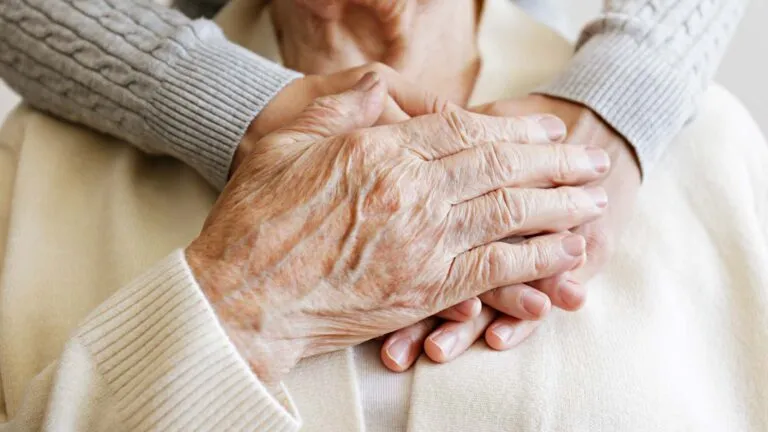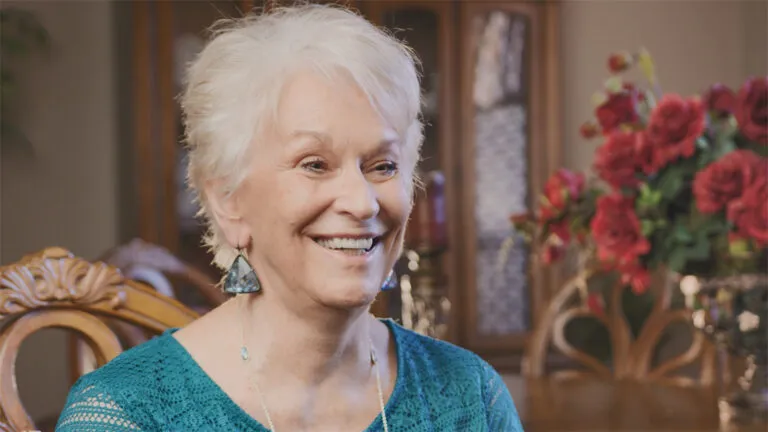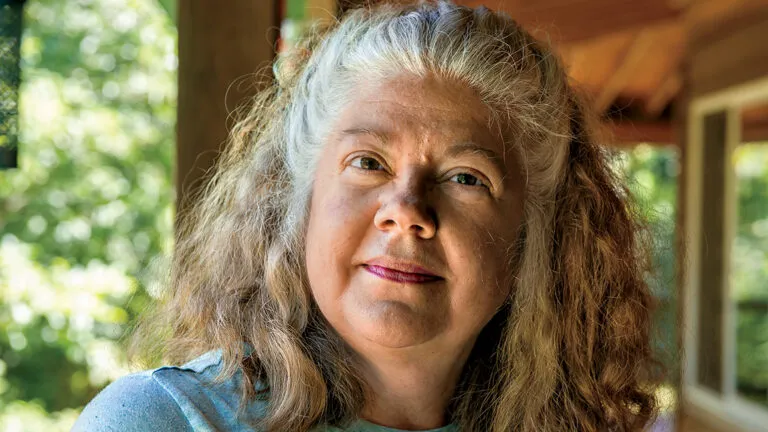“Who is this again? You’re a friend of my mom’s?” I didn’t know the woman on the other end of the line and couldn’t make sense of what she was saying.
“Your mother is not doing well,” she said. “Her husband moved out and she’s in bad shape. She’s not eating. Not sleeping.”
“But I was just there a month ago, in June,” I said. “They were doing fine.” Mom was 72 and had married a year earlier, after a long time being single. I was glad that she would have a loving companion in her golden years. What happened?
Mom’s friend didn’t know the details. “Look, she needs someone to be with her,” she said. “Here, why don’t you talk to her?”
There was soft breathing on the other end, but no one spoke. “Mom?”
READ MORE: FAITH AND PRAYER HELPED HER OVERCOME DEPRESSION
Her voice was so faint I had to strain to hear. “I made a mistake.” That was all I could get out of her.
“Everything’s going to be okay,” I said. “I’ll call Shelley. She’ll come stay with you for a few days.” My older sister would be moving to Germany with her husband soon, but for now she was still in Seattle, closer to our mom’s cabin in eastern Washington than I was in Los Angeles.
I hung up, bewildered. What was the matter with Mom? She didn’t sound like her bubbly self at all. She was the one who cheered me up when I was laid off or went through a breakup, reassuring me that I would bounce back. “Never forget that God loves you, Marni,” she would tell me. “He’ll see you through this.” I wished my faith were as strong as hers.
Mom will be fine, I thought. Probably just needs some TLC.
She didn’t get any better the week my sister was there. Shelley had her move to deal with, so we decided it was best to have Mom come and live with me for a while. The change of scenery would do her good. And she loved animals. She’d get a kick out of my sassy Chihuahuas, Taco and Tinker.
I made the spare bedroom in my rental house cozy and in late July I got Mom settled in. Or tried to, anyway. But I couldn’t seem to rouse her out of the strange torpor that had taken her over. She wouldn’t say more than a few words in response to my attempts at conversation.
She’d been a home-ec teacher and I thought I could get her to cook—or better yet, bake—with me, but she showed no interest in the kitchen and barely touched the food I made for her. She didn’t want to go for walks with me and the dogs; in fact, she didn’t take much notice of them.
She spent most of her time sitting on the couch, staring into space. Yet at night, she was restless, pacing the house when she should have been sleeping.
I didn’t like leaving her while I went to work. But I had just started a new job as a marketing writer—which, despite the high pressure and long hours, I knew I was lucky to have in a recession—and I couldn’t take time off yet.
I checked on Mom regularly, calling her on my lunch break and during my commute. In the evening I’d get home to find her in the same spot on the couch as when I’d left in the morning, as if she hadn’t moved all day. It didn’t seem to matter whether I was home or not.
Mom needed professional help. I took her to a psychiatrist. He diagnosed her with major depression, likely triggered by the emotional trauma of her husband’s rejection.
Depression? I’d thought it was more of a midlife thing, but the psychiatrist said the symptoms matched Mom’s: low mood and energy, lack of appetite, loss of interest in activities, insomnia, feelings of worthlessness.
“Depression can be debilitating,” he told me. “I’m prescribing an antidepressant, but your mother’s not going to get better overnight. It will take time. Six to twelve weeks for the medication to have its full effect.” He said I should give her the pills myself and keep them someplace where she couldn’t find them. “You don’t want her to skip a dose or, worse, overdose,” he warned me.
I followed the doctor’s orders and made sure Mom took her medication every day, then carefully tucked the bottle of pills away. I called her from work every chance I got. Sometimes I only had time to say, “I love you, Mom,” but I thought she needed to hear that as much as she needed medication.
READ MORE: WILLIAM STYRON ON DEPRESSION
I recorded uplifting TV shows for us to watch together. I’d sit on the couch next to her, watching her and hoping for some change in her expression. Even America’s Funniest Home Videos didn’t get so much as a flicker of a smile out of her. Which broke my heart, because my mom was known for her laugh—gentle, melodic, like a wind chime tinkling in the breeze.
I longed to hear her laughter again, to feel the lightness it always brought me, and even more, to have her feel that lightness of being again.
I tried not to give in to worry and impatience when I didn’t notice any improvement in her symptoms. It’s only been a couple of weeks, I told myself. The medication needs time to work.
Then one evening at the end of August, I came home from work to find my mother lying on the floor, unconscious. She’d found the pills and taken the entire bottle. Mom was rushed to the hospital. I stationed myself at her bedside. Her hand felt so small and fragile in mine. How could I have left her alone?
“I’m sorry I wasn’t there for you, Mom,” I said. “It won’t happen again, I promise. Just come back to me, please.”
She regained consciousness and was put on a new medication. After five days, she was released to my care and enrolled in an outpatient mental-health program in my neighborhood. Even though she would be there four days a week, I knew what I had to do. I couldn’t work full-time and take care of Mom. I quit my job.
My friends thought I was being rash. “How are you going to pay your bills? How are you going to keep a roof over your head?” I didn’t have a plan. I figured I would use my credit cards, take money out of my retirement account if necessary. All I knew was that I had to do more for Mom. A lot more. She needed me!
Mom’s weight was down to 89 pounds. The only way I could get her to eat was to eat with her. She liked Mexican food, so I made chicken enchiladas smothered in cheese. “A bite for you,” I’d coax, “a bite for me.” I bought tubs of coffee ice cream, her favorite flavor, and we’d share them in front of the TV.
We watched a lot of TV. Hallmark movies, Dancing With the Stars. The new medication worked better, but Mom still wasn’t sleeping well. I stayed up with her, snuggling next to her on the couch to keep her company. Sometimes I dozed off, but I wanted to show her that she wasn’t alone, that I would be there for her, no matter what.
Mornings, Monday through Thursday, a care van would pick her up and take her to her therapy program. Going to school, I called it. Mom couldn’t stand it.
“I don’t want to go,” she’d say. “Those other people, they’re so negative.”
“What do you want to do?” I’d ask, hoping there was some activity that would lift her out of her funk.
The only thing she said was, “I want to be with you.”
All the more reason that I had to devote myself to Mom’s care. She’d devoted herself to raising me. This was my way of giving back. I stopped going out with friends. I didn’t date. I even quit volunteering with a community group teaching teen girls creative writing. Mom’s health had to come first.
As the months passed, her physical health gradually improved. She was eating again and gained weight. So did I, since I was eating right along with her. She started sleeping better. Yet emotionally, spiritually, she was still adrift, as if she’d lost not just her sense of self-worth, but also the faith that had anchored her all her life.
I tried to get her to read the Bible, or even some of my touchy-feely devotional books. She just shook her head. “God must be angry with me,” she said.
READ MORE: ON DEALING WITH DEPRESSION
“He’s not angry,” I said. “It’s like you always told me: God loves you. He’ll see you through this.”
Mom wasn’t persuaded. If I couldn’t assure her that God loved her, at least I could tell her how much I loved her, make her feel wanted and needed. I reminded her what a great cook and baker she was. “There are people who could use your skills,” I told her. “You can help them, like I helped girls with writing. And I might be in my forties, but I still need you to be my mom.”
I couldn’t understand why nothing I said, nothing I did, nothing I thought of, seemed to make a difference. Didn’t Mom want to get better? Meanwhile I’d maxed out my credit cards and been forced to dip into my retirement savings. The stress and frustration got to me. Except for walking Tinker and Taco and buying groceries, I hardly left the house.
After the care van took Mom to “school,” I’d sink onto the couch. I’d spend the hours she was at her therapy program napping, snacking or zoning out in front of the TV.
One day I was sitting there, clicking the remote with one hand and eating ice cream with the other. A spoonful fell on my pants. I halfheartedly wiped at the stain when it hit me. Here it was the middle of the afternoon, and I was still in my pajamas. Lazing on the couch stuffing my face, no less. How pathetic!
What kind of worthless excuse for a human being was I? Worthless. If this was how I felt, how much worse must it be for my mom? Suddenly I understood why she was so listless, why I’d find her in the same spot morning and evening. It wasn’t that she didn’t want to get moving and get better. She wasn’t able to.
Just like she wasn’t able to connect with God anymore. I sat up straight, energized. If Mom couldn’t pray, I’d pray for her, however clumsily. God, maybe I’m so burned out right now I can’t help Mom, but I know you can. Help her heal. Help her feel loved again.
Even though I didn’t see a change in Mom, I kept praying. And I felt a change in myself. An acceptance of things as they were, not frustration and helplessness that they weren’t where I wanted them to be.
One night in December, Mom and I were up late as usual, sitting together watching America’s Funniest Home Videos. The episode was all about animals. I was half asleep when I heard a sound that didn’t come from the TV. A melodic tinkling.
Like Mom was…laughing?
I glanced over. Her mouth was turned up the tiniest bit at the corners. “Ha!” she said again.
I’d never heard anything sweeter.
“That’s pretty funny, huh, Mom?” I said.
She nodded. “I haven’t laughed in a long time.”
I knew then that Mom had turned a corner. The psychiatrist had said recovering from depression would take time. I just didn’t realize it would happen in God’s time, not ours.
After that, I saw my mother healing a little more every day, rediscovering herself, her faith. Almost five years after she came to live with me, Mom and I are still roommates. Happy roommates. We go for long walks with Taco and Tinker. We cook together—healthier dishes than I was making on my own.
I went back to volunteering with the creative-writing group, and Mom has joined me. She’s putting her home-ec skills to good use baking cupcakes and cookies for the girls who come to the workshops.
As much as I love caring for my mom and being with her, I’ve learned to make time for myself too. I found a job as an online editor, so I work from home while she’s at her therapy program. I go out with friends, and I started dating a great guy. One of the things we bonded over was being caregivers for our mothers.
Not long ago, I asked Mom what she’d like to tell other people who are struggling with depression.
“That this too shall pass,” she said. “That time and love heal.” She looked at me and smiled. “I know that I am loved and cared for, and I am so grateful for that.”
I put my arm around her and held her close. “Me too, Mom. Me too.”
Read our tips for taking care of yourself as you care for a loved one.
Did you enjoy this story? Subscribe to Guideposts magazine.






